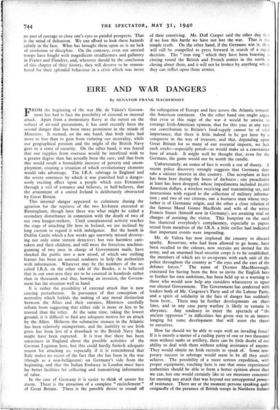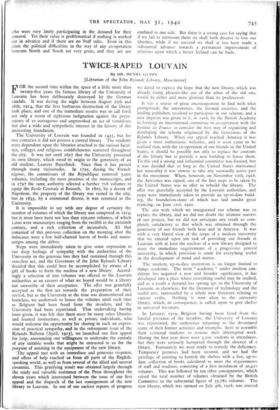EIRE AND WAR DANGERS
By SENATOR FRANK MACDERMOT
FROM the beginning of the war Mr. de Valera's Govern- ment has had to face the possibility of external or internal attack. Apart from a momentary flurry at the outset on the subject of air-raid precautions, it has until recently been the second danger that has been more prominent in the minds of Ministers. It seemed, on the one hand, that both sides had more to lose than to gain from violating our neutrality, while our geographical position and the might of the British Navy gave us a sense of security. On the other hand, it was feared that our supplies from overseas would be interfered with to a greater degree than has actually been the case, and that from this would result a formidable increase of poverty and unem- ployment, creating a situation of which revolutionary elements would take advantage. The I.R.A. sabotage in England and the severe sentences by which it was punished had a danger- ously exciting effect upon a people which sees Fenianism through a veil of romance and believes, or half-believes, that the attainment of a united Ireland is deliberately obstructed by Great Britain.
This internal danger appeared to culminate during the agitation for the reprieve of the two Irishmen executed at Birmingham, though later there was what might be called a secondary disturbance in connexion with the death of two of our own hunger-strikers. Until conspiratorial activity reaches the stage of attacking life here in Ireland, we are inclined by long custom to regard it with indulgence. But the bomb in Dublin Castle which a few weeks ago narrowly missed destroy- ing not only some sixteen detectives but two harmless care- takers and their children, and still more the ferocious machine- gunning of two men in charge of Government mails, have shocked the public into a new mood, of which one striking feature has been an unusual readiness to help the authorities with information. Whatever may be the numbers of the so- called I.R.A. on the other side of the Border, it is believed that in our own area they are to be counted in hundreds rather than in thousands and that, barring an invasion, the Govern- ment has the situation well in hand.
It is rather the possibility of external attack that is now causing perturbation. In pursuance of that conception of neutrality which forbids the making of any moral distinction between the Allies and their enemies, Ministers carefully refrain from suggesting that either side is more or less to be trusted than the other. At the same time, taking the lowest ground, it is difficult to find any adequate motive for an attack by the Allies. Hitherto the submarine menace in the Atlantic has been relatively unimportant, and the inability to use Irish ports has been less of a drawback to the British Navy than might have been expected. It is true that there has been uneasiness in England about the possible activities of the German Legation here, but this could hardly furnish adequate reason for attacking us, especially if it is remembered that Italy makes no secret of the fact that she has been in the war (though as a non-belligerent) on Germany's side from the beginning, and that the Italian Embassy in London must have far better facilities for collecting and transmitting information of value.
In the case of Germany it is easier to think of causes for alarm. There is the attraction of a complete " encirclement " of Great Britain. There is the possible desire to round off the subjugation of Europe and face across the Atlantic towards the American continent. On the other hand one might argue that even at this stage of the war it would be unwise to estrange Irish-American opinion, that for this year at any rate our contribution to Britain's food-supply cannot be of vital importance, that there is little indeed to be got here by a conqueror in the way of treasure, and that, depending upon Great Britain for so many of our essential imports, we lack such stocks—especially petrol—as would make us a convenient base of attack. It might well be thought that, even for the Germans, the game would not be worth the candle.
Unfortunately, an ounce of fact is worth a ton of theory. A recent police discovery strongly suggests that Germany does take a sinister interest in this country. One aeroplane at least has been here during the hours of darkness ; one parachutist at least has been dropped, whose impedimenta included 20,000 American dollars, a wireless receiving and transmitting set, and instructions with regard to the collection of military informa- tion ; and two of our citizens, one a business man whose step- father is of Germanic origin, and the other a close relation of the famous Maud GOnne MacBride and wife of the writer Francis Stuart (himself now in Germany), are awaiting trial on charges of assisting the visitor. This footprint on the sand has shattered everybody's complacency, especially as papers seized from members of the I.R.A. a little earlier had indicated that important events were impending.
Mr. de Valera has now implored the country to discard apathy. Reservists, who had been allowed to go home, have been recalled to the colours, new recruits are invited for the army, and an unarmed local security corps is to be established, the members of which are to co-operate with each unit of the police throughout the country as " the eyes and the ears of the defence forces." The name of Dermot MacMurrough, execrated for having been the first to invite the English here to further his own ambitions, has been held up as a warning to those who would now help any outsiders whatsoever to upset our elected Government. The Government has conferred with leaders both of Mr. Cosgrave's Party and of the Labour Party, and a spirit of solidarity in the face of danger has suddenly been born.. There may be further developments on these lines, and in any case party warfare is likely to remain in abeyance. Any tendency to enjoy the spectacle of " the ancient oppressor " in difficulties has given way to an intense longing for some development that will avert the threat to ourselves.
How far should we be able to cope with an invading force? If it is merely a matter of a raiding party of one or two thousand men without tanks or artillery, there can be little doubt of our ability to deal with them without asking assistance of anyone. They would obtain no Irish recruits to speak of. Some tem- porary success in sabotage would seem to be all they could achieve. The possibility of a more serious expedition, with proper equipment, reaching here is one that more experienced authorities should be able to form a better opinion -about than we can, but one would certainly like to see measures concerted for meeting any attack that was beyond our unsupported powers of resistance. There are at the moment persons speaking quite resignedly of the presence of British troops in Northern Ireland who were very lately participating in the demand for their removal. Yet their value is problematical if nothing is worked out in advance and if there are no Staff talks. Even in this crisis the political difficulties in the way of any co-operation between North and South are very great, and they are not confined to one side. But there is a strong case for saying that if we fail to surmount them we shall both deserve to lose our liberties, while if we succeed we shall at last have made a substantial advance towards a permanent improvement of relations upon which a better Ireland can be built.































 Previous page
Previous page